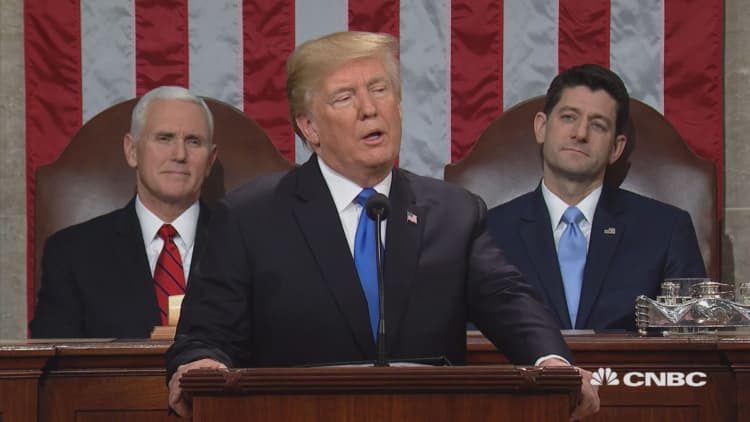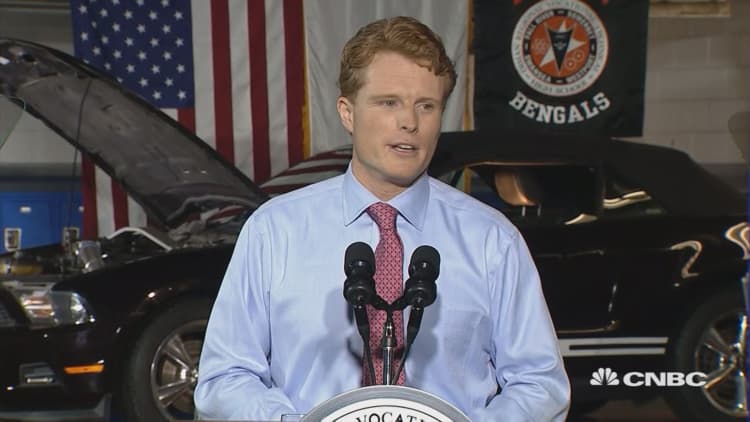President Donald Trump's first State of the Union speech touted higher 401(k) balances bolstered by a soaring stock market and tax cuts intended to put more money in your wallet.
Yet the effects on your savings and income may be temporary, experts say. And what was not addressed with regard to retirement savings and tax cuts could have a more meaningful impact on your bottom line.
The speech was a "victory lap" for Trump, who is just coming off passage of the Tax Cuts and Jobs Act, according to Scott Greenberg, senior analyst at the Tax Foundation, a non-profit tax policy organization.

"The stock market has smashed one record after another, gaining $8 trillion in value," Trump said in his speech. "That is great news for Americans' 401(k), retirement, pension, and college savings accounts."
But here's what you need to keep in mind before taking your own victory lap to celebrate.
Real effects of tax reform still uncertain
The Tax Cuts and Jobs Act moved through Congress swiftly, but it will take more time to see the legislation's true effects.
"The idea that the tax bill will have a positive economic effect is probably correct," Greenberg said. "That we're already seeing a large economic effect from the tax bill at the very least is hard to verify."
Individuals should see more money in their paychecks starting this month, as less in federal taxes is withheld.
And while roughly 3 million individuals have received bonuses tied to the tax cuts, "it's a weird argument to claim that the bonuses are proof that the tax bill is working," Greenberg said.
That is because, in theory, the tax bill will work by increasing companies' ability to invest, which in turn leads to higher productivity and then higher wages. But it's too early to see those effects.
"That's something you wouldn't expect to see immediately," Greenberg said.
Trump's claim that April will be the last time you file under the previous tax system should also be subject to scrutiny, according to Greenberg, as the tax cuts for individuals right now will only last for eight years.
Another Trump claim, "we enacted the biggest tax cuts and reforms in American history," is also questionable. Greenberg said the tax legislation of 1981 and 1986 could be stronger contenders for that distinction.
"I would disagree with him, but that would be up for debate," Greenberg said.
401(k) gains subject to market gyrations
For anyone who has a 401(k) invested in the stock market, the returns have been quite high, said Teresa Ghilarducci, professor of economics at the New School for Social Research.
But a look back to the financial crisis 10 years ago should serve as a stark reminder on how quickly that can change. At the end of 2008, savers had lost as much as 37 percent of their 401(k) savings, according to Ghilarducci. That put pressure on them to recoup both that money and lost gains.
Savers need to make sure they do not take the recent momentum and their retirement savings for granted.
"I really want to warn people not to take money out of their 401(k) and to brace themselves for the next recession," Ghilarducci said.
You're on your own for retirement
While Trump touted stock market gains and what it meant for 401(k) savings, other notable retirement resources were not mentioned.
That goes for Social Security, which is set to deplete its trust fund in 2035, and state and local pension plans, which are underfunded. State-driven retirement plans are now subject to more regulatory scrutiny under the Trump administration. The myRA program, which was designed for those who do not have access to a retirement savings plan at work, was also shuttered under Trump.
"The absence of talk about Social Security and the mention of 401(k)s makes me think this administration feels retirement savings can come from private sources," Ghilarducci said.
Though the emphasis is relying on your own savings for retirement, about 50 percent of individuals do not have access to a 401(k) plan, noted Richard W. Johnson, director of the Program on Retirement Policy at the Urban Institute.

"Sure, balances are up over a year ago, but most people are still not saving enough for retirement," Johnson said. "As Social Security remains a big question mark … it means that private savings could be more important than it is today, so people need to save more."
More from Personal Finance:
These two big budget programs were missing from Trump's address
Trump cites 401(k) gains in speech, yet most workers don't have one
Trump's speech touts college savings but ignores student debt


